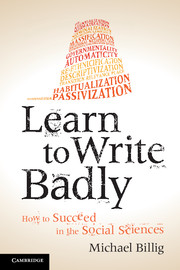Book contents
- Frontmatter
- Contents
- Acknowledgements
- 1 Introduction
- 2 Mass publication and academic life
- 3 Learning to write badly
- 4 Jargon, nouns and acronyms
- 5 Turning people into things
- 6 How to avoid saying who did it
- 7 Some sociological things: governmentality, cosmopolitanization and conversation analysis
- 8 Experimental social psychology: concealing and exaggerating
- 9 Conclusion and recommendations
- References
- Index
6 - How to avoid saying who did it
Published online by Cambridge University Press: 05 June 2013
- Frontmatter
- Contents
- Acknowledgements
- 1 Introduction
- 2 Mass publication and academic life
- 3 Learning to write badly
- 4 Jargon, nouns and acronyms
- 5 Turning people into things
- 6 How to avoid saying who did it
- 7 Some sociological things: governmentality, cosmopolitanization and conversation analysis
- 8 Experimental social psychology: concealing and exaggerating
- 9 Conclusion and recommendations
- References
- Index
Summary
I have been arguing that social scientists, who write in ways that transform people into things, tend to write imprecisely. When it comes to describing human actions, ordinary verbs have the edge on the big izations and ifications. In the previous chapter, I offered a number of examples to support this view but in the present chapter, I want to go further: I want to give technical reasons why this should be the case. In order to sustain my points, I will have to take a number of twisty turns. Principally I will be drawing on ideas from linguists to show what sorts of grammatical moves authors make when they write in unpopulated ways and then I will need to argue why such moves might be problematic for social scientists.
This will not be straightforward, because I will need to use and also to hold at a distance some linguistic izations, such as ‘nominalization’ and ‘passivization’. I was faced with a similar problem in the previous chapter, when I needed to use and to criticize the concept of ‘reification’. I will be suggesting that even critical linguists, who see ideological problems with ‘nominalization’ and ‘passivization’, fail to heed their own warnings when it comes to their own writing. My preference is to use the verb forms – ‘to nominalize’ and ‘to passivize’ – but this will not always be possible, especially when I follow the arguments of those who use the nouns. There might also be times when I could have avoided using the izations myself, but use them regardless: it can sometimes be hard to climb out of the pit in which we are accustomed to play.
Information
- Type
- Chapter
- Information
- Learn to Write BadlyHow to Succeed in the Social Sciences, pp. 115 - 142Publisher: Cambridge University PressPrint publication year: 2013
